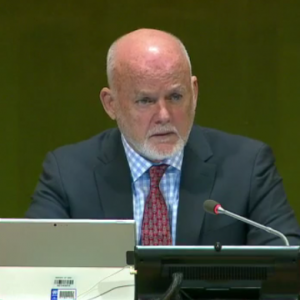Statement by the President of the U.N. General Assembly on Agenda Item 73: Oceans and the law of the sea
7 December 2016
Distinguished Delegates,
Ladies and gentlemen,
The Ocean is the lifeblood of our planet. It is a vital and complex ecosystem that billions of people depend on for their livelihoods, food security, cultural identity and traditions.
We are all united by the Ocean – with its boundless energy, indispensable trade routes, and marine resources feeding our communities.
As we meet, however, our beloved Ocean is in peril, and its state of health is threatening humanity’s sustianable place on this planet.
The over-exploitation of fish stocks, and pollution from fertilizers, plastics, and waste, are diminishing its resources, while climate change is exerting enormous pressure on the Ocean as well as coasts, and marine ecosystems. Rising sea-levels, ocean acidification, increasing deoxygenation, and a reduced mixing of ocean water are exacerbating challenges, while the changing interaction between the Ocean and atmosphere is affecting our climate, weather and air quality.
The importance of the Ocean to humanity and to the planet was acknowledged by world leaders last year when they adopted the 2030 Agenda for Sustainable Development.
The 2030 Agenda critically included Sustainable Development Goal 14 which aims to conserve and drive sustainable use the Ocean, seas and marine resources for sustainable development.
It pursues urgent action to reverse the cycle of decline in which our Ocean is currently caught.
The General Assembly has a central role to play in protecting the Ocean and its resources. The resolutions that are considered and adopted under this agenda item are essential to these efforts. I would like to highlight the following key observations about the resolutions.
The annual Oceans Omnibus resolution reflects the critical importance of the 2030 Agenda. I welcome its focus on important broad-ranging issues relating to the Ocean and Law of the Sea, and the central importance it gives to the UN Convention on the Law of the Sea. This includes capacity-building, the peaceful settlement of disputes, the work of the International Seabed Authority, maritime safety and security, marine environment and resources, protection of refugees and migrants at sea, and the safety of fishers and vessels.
On processes, the decision to focus the annual Informal Consultative Process on Climate Change and Oceans in 2017, and on Anthropogenic Underwater Noise in 2018, is welcome. So too is the importance placed on the ‘First Global Integrated Marine Assessment’ for the implementation of the 2030 Agenda, and the work on the second cycle of the ‘Regular Process for Global Reporting and Assessment of the State of the Marine Environment, including Socioeconomic Aspects’.
I also join in encouraging delegations to continue the high-levels of goodwill and momentum from the First and Second sessions of the Preparatory Committee on the “Development of an international legally binding instrument under the United Nations Convention on the Law of the Sea on the conservation and sustainable use of marine biological diversity of areas beyond national jurisdiction” (BBNJ).
The annual Sustainable Fisheries resolution highlights the nexus between this issue and food security, prosperity and poverty reduction for current and future generations. I share delegations’ concern, as expressed in the draft resolution that illegal, unreported and unregulated fishing constitutes a serious threat to fish stocks, marine habitats and ecosystems, and that efforts to deter and combat it must be renewed.
The resolution to be adopted later today declaring 2 May, annual World Tuna Day, is an important step in recognizing the critical role of tuna to sustainable development, food security, economic opportunity, and livelihoods of so many around our world.
Excellencies,
The high-level United Nations Conference to Support the Implementation of Sustainable Development Goal 14, to be held from 5 to 9 June 2017, is the next milestone in our collective efforts to save the ocean.
The Conference will bring together all stakeholders – Governments, civil society, scientific and academic experts, and local communities – in this collective endeavor.
I am confident that under the able leadership of Fiji and Sweden as co-presidents of The Ocean Conference, and of Portugal and Singapore as co-facilitators of the Call to Action – that The Oceans Conference will be a game-changer in securing the political and voluntary commitments, launching strategic multi-stakeholder partnerships, and mobilizing the global Ocean community to drive action to effectively implement SDG14 by 2030.
I encourage you all to participate in the preparatory meeting for The Ocean Conference that will be held on 15-16 February. I also encourage all Governments to participate at the Conference in June at the highest level. During that week we will also be celebrating World Environment Day on 5 June and World Ocean Day on 8 June.
In closing, Excellencies, I would like to acknowledge and thank the co-chairs who have led processes under this Agenda item, including Barbados and New Zealand, Cyprus and Peru, and Trinidad and Tobago.
I would also like to thank Norway and South Africa, and Nauru on behalf of the Pacific Small Island Developing States, for their work and dedication as coordinators of the draft resolutions.
Thank you.


